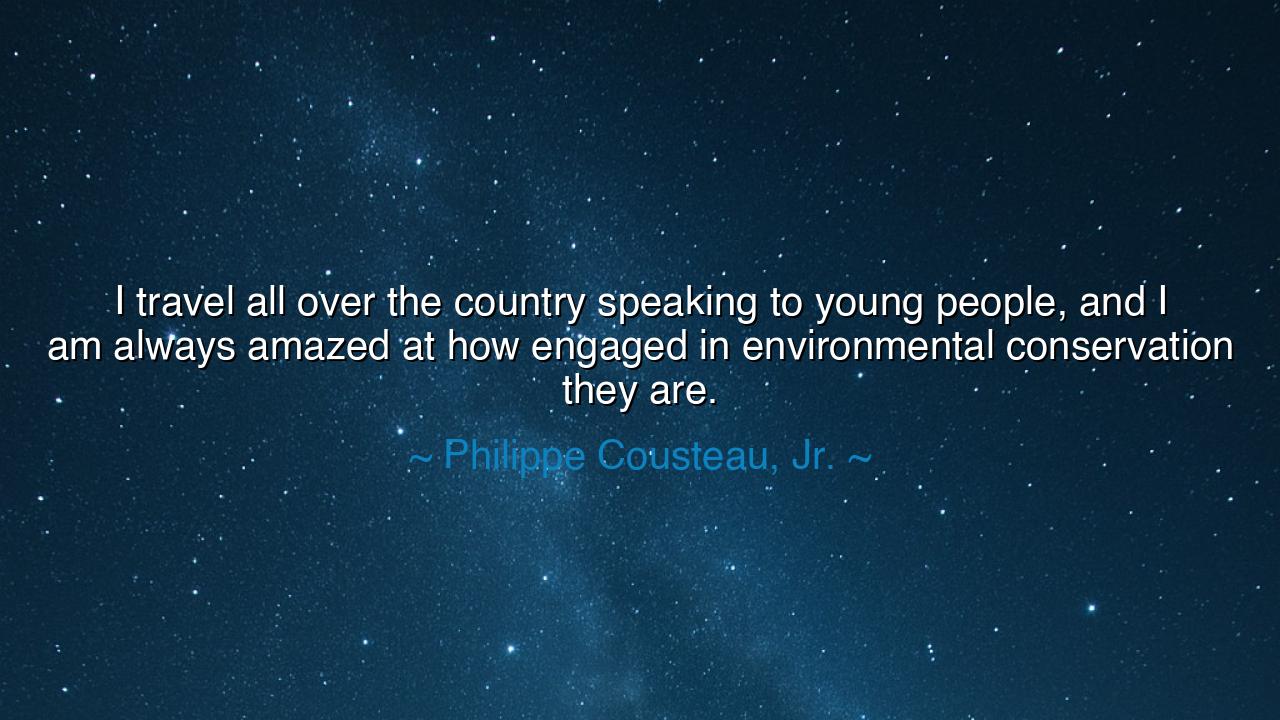
I travel all over the country speaking to young people, and I am
I travel all over the country speaking to young people, and I am always amazed at how engaged in environmental conservation they are.






Hear the words of Philippe Cousteau, Jr., heir to a great legacy of ocean voyagers and guardians of the earth: “I travel all over the country speaking to young people, and I am always amazed at how engaged in environmental conservation they are.” In these words lies not only admiration but hope, for he reveals a generation rising with passion, a generation that sees the wounds of the earth and does not turn away. His voice is both testimony and blessing: that amidst the shadows of destruction, there burns the fire of renewal in the hearts of the young.
At the heart of his saying is the spirit of youthful engagement. Too often the young are dismissed as distracted, careless, or indifferent. Yet Cousteau bears witness to the opposite: that they are eager, awake, and yearning to defend the fragile world they will inherit. They are not paralyzed by despair but quickened by responsibility. Where their elders often grow weary with compromise, the young are animated by urgency, knowing that their future depends upon the choices of today.
History has seen this pattern before. It was young voices that ignited the civil rights movement in America, students and children who marched in Birmingham and faced the hoses and dogs with unflinching courage. It was young people in the late 1960s and early 1970s who poured into the streets on the first Earth Day, declaring that polluted rivers and poisoned skies would no longer be tolerated. Again and again, it is the young who rise first, unafraid to demand change when others have grown resigned. Cousteau’s words remind us that this same spirit is alive in the movement for environmental conservation.
The wisdom here is deeply prophetic. For the crises of the environment—melting ice, vanishing forests, rising seas—unfold not in a single year, but across generations. The elders may pass before the full cost is due, but the young will live to face it. Thus, their engagement is not abstract but immediate, not idealistic only but practical and necessary. They fight not merely for a cause, but for their own survival, for the right to inherit a world still fertile, still breathing, still alive with beauty.
Cousteau’s amazement is also a call to humility. The elders, with their long experience, must not stifle the zeal of the young with cynicism. Instead, they must learn to listen and to support, to channel youthful energy into lasting structures of change. For it is in the union of youthful fire and seasoned wisdom that true progress is made. If the young bring vision and urgency, the old must bring guidance and resilience, so that together they may weave a future strong enough to withstand the storms to come.
The lesson for us is clear: encourage the young, do not dismiss them. If they are engaged in conservation, let their voices be heard in classrooms, in legislatures, and in communities. Support their initiatives, amplify their ideas, and honor their courage. And if you are young, do not doubt your strength: your passion is not small, your actions are not wasted, for they form the tide that can reshape the destiny of nations and of the earth itself.
Therefore, children of tomorrow, let Philippe Cousteau’s words stir your heart. Rise in defense of the earth. Do not be silent, do not be idle. Plant trees, clean rivers, demand justice, and inspire others. For you are not merely the future—you are the present, the living flame that will carry humanity through this age of peril into an age of renewal. And let all generations remember: hope is not a gift we wait for—it is a labor we perform together.






AAdministratorAdministrator
Welcome, honored guests. Please leave a comment, we will respond soon